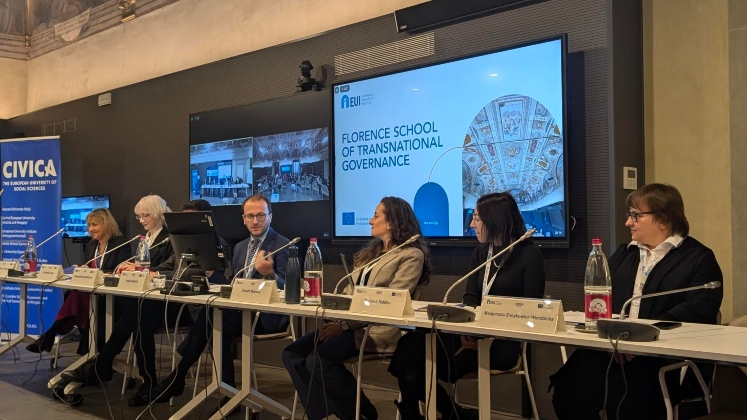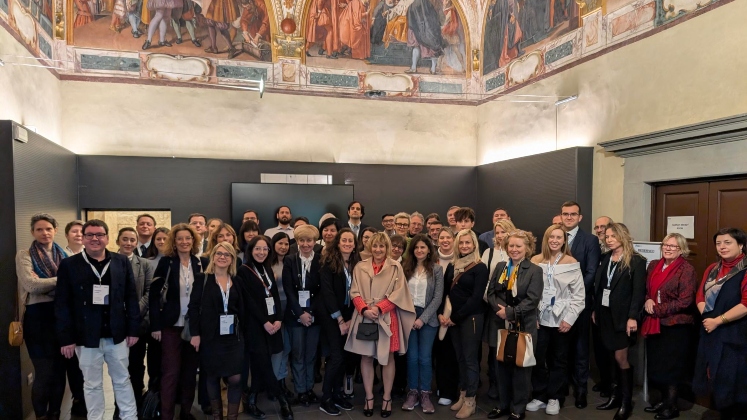Dr. Angelo Martelli attended the KIND (Knowledge and Informal Diplomacy) Conference last November at the European University Institute (EUI). He tells us about his research and his experience in this exclusive interview ↓

What do you work on in your research?
My work revolves around the political economy of labour market institutions and policies, with an application to a number of topics including the future of work, structural reforms, the Economic and Monetary Union and migration.
What attracted you to this area of research?
As someone born in Southern Italy, I have always been interested in understanding the role played by institutions in explaining gaps in economic development and shaping the absorption of structural phenomena. When I moved to London for my PhD, I noticed that the fellow Italians I would meet would most likely work either in Café Nero or in high finance. Incidentally I had just come across a couple of seminal papers on job polarization published by top scholars which could describe quite well this pattern. This is what led me to delve into this topic and investigate whether this hollowing out of the labour market, typical of the US and the UK, could be observed across European countries. It turned out that a stronger set of labour market institutions, from employment protection legislation to wage coordination, trade unions and minimum wages, would ultimately influence how a technological shock impacted employment structures.
What are you working on at the moment?
Together with Tommaso Crescioli (Bocconi University) and Tim Vlandas (Oxford University) we have just released a working paper titled Schumpeter meets Marx: AI, Robots and the Political Economy of Jobless Recoveries investigating the ramifications of technology adoption on the European labour force during the Great Recession, a critical juncture for economies characterized by strong labour market institutions. In it we develop a framework positing that the interplay between technology type and worker characteristics shapes firm adoption decisions and their consequent impacts on workers.
How will your research contribute to better society and policy outcomes?
At a time when the advancement of technology is seen as inevitable, our research challenges the argument that industrial relations systems are no longer important safeguards of wage solidarity. Having our paper acknowledged by the IMF and putting forward a contribution that would feature in the technical review of one of their country missions was extremely rewarding. The research on structural reforms acted as the basis for advancing proposals to the European Commission DG EMPL in their effort to revamp a database on labour market reforms. But probably the topics I am most fond is migration on which we wrote several policy briefs advancing recommendations for the G7 and G20.

How did this conference come about?
I have been involved in CIVICA for the past three years and contributed to the European Week held last year at the LSE. My former colleague Marina Cino Pagliarello, whose research has focused on the relationship between education and diplomacy thought that CIVICA would be an ideal case to understand the role played by universities as informal diplomatic actors.
Now based at the EUI, Marina provided the initial impetus and coordinated the conference. Given my role as Programme Director of the LSE-Bocconi Double Degree, it felt natural to involve Bocconi University. We also felt that SGH’s role in CIVICA for Ukraine had been crucial and therefore felt that their contribution was fundamental. We wanted a mix of high-level strategic discussions and a more hands on panel focused on research, education and engagement activities.
Do you have any advice for people who are thinking about applying to CIVICA funding but haven’t done so yet?
It is certainly a unique opportunity not only to deepen one’s understanding of a particular research or education area, but to engage with scholars from the other top partner universities and truly experiencing a broader sense of community. At a time when scale matters more than ever, institutions working as part of an alliance, have a much better chance to advance their strategic goals. This applies also to researchers and educators within them, without active collaboration it is harder to make meaningful contributions. Therefore apply, it could be the start of a great journey together!
Photo credits: Emily Harrison (LSE).